Part 5⁄7 How could the original Qibla be changed without a huge backlash? Or did everyone just all forget at the same time? The answer to this is understanding the Shame Factor. Dan Gibson explains why later writers covered up the Qibla struggles of the Umayyads.
Transcript
Hello, I am Dan Gibson, and this is video # 5 in the series The Qibla Story.
So far we have followed the Qibla Story through the origins of Islam, the Ka’ba in the city of Petra, the moving of the Black Rock to Mecca in Saudi Arabia, the Between Qibla of general Ḥajjāj, the Parallel and Africa Qiblas of North Africa and Spain.
And now we come to the period at the end of the Umayyad rule and the start of the Abbasid rule.
This time period is full of conflict and confusion as the Islamic world slowly looses confidence in the Umayyad Caliphs.
Now note that the story really centers on Ḥajjāj ibn Yūsuf, a small man with high aspirations. He started out as a school teacher in Medina, but eventually moved to Damascus where he joined the Caliph’s body guard. From there he worked his way into the Caliphs personal service, and for the rest of his life he served the Caliphs in Damascus. He was eventually given the title of Amir, or General, and he led the army against Ibn Zubayr, in the second Islamic civil war.
Later, after the war, he searched out people who had opposed the Caliph, and had them beaten, and in some cases, had their heads chopped off. Ḥajjāj was faithful to the office of the Caliph, and supported each new caliph as they came along. In this way the people learned to respect and fear him.
One time a man asked for exemption from the army because of a hernia. He was granted it, but when Ḥajjāj heard of it, he revoked the exemption. A group of soldiers then rebelled against Ḥajjāj, so he had the leader killed, and the heads of the 18 rebel soldiers set up on posts for everyone to see.
On the other hand, Ḥajjāj highly praised those who fought well, and who acted sacrificially for the army and the Caliph. In the year 74 AH Ḥajjāj was made the governor of Iraq. He then put down many rebellions and helped solidify the rule of the Caliphs. Ḥajjāj proved himself to be a crafty General, and skilled in understanding the character of people, and how to manipulate them or motivate them to obey.
Ḥajjāj was the most loyal servant that a Caliph could wish for. In the end, Ḥajjāj’s daughter wed Mansur, son of Caliph al-Walid I. And the daughter of Ḥajjāj’s brother Muhammad was wed to the future caliph Yazid II. They even named their first-born son after Ḥajjāj. We know much about the relationship between Ḥajjāj and Caliph Abd al-Malik as many letters between them have survived.
At the pinnacle of his power, in 702 al-Ḥajjāj built the Wasit (Between) mosque and he founded the city of Wasit around it, and built a large prison there. Later historians would postulate that Wasit was midway between Basra and Kufa, and that was the origin of the name. However the distance from Kufa to Wasit was 174 km, and Basra to Wasit was 230 KM. It wasn’t really in the middle. It was like a great triangle.
Al-Ṭabarī tells a different story. When Ḥajjāj was at the spot where Wasit was later built, he noted a local monk who was keeping the area clear and clean. When he asked the monk, he said that God had showed him that this area would be used for worship “as long as there remains on earth anyone who proclaimed His oneness.” Al-Ḥajjāj then decided to build his mosque and his city on that spot. It had nothing to do with being half-way between Basra and Kufa as later writers would claim.
That was an invention to give some reason why the mosque and city were called “Between.” But now we know better.
Ḥajjāj then set about bettering the eastern part of the Muslim empire.He introduced new coinage, and worked hard to improve agriculture.
He also became involved in religious improvements. He set about introducing a uniform version of the Quran, so that some theological quarrels could be settled. The Byzantine rulers at that time specifically taunted the Muslims, claiming that they knew that Ḥajjāj had made additions to the Qur’an. You see, he cleverly did not remove anything from the existing Qur’ans, but he added to it bits that had been “lost.”
Along with this he divided the text of the Qur’an into thirty parts and introduced new vowel markings. In doing this, he could slightly manipulate the meaning of the text to his favor, and purge anything that might be hostile to the Umayyads or to himself. He then declared this version to be the only valid version of the Qur’an, and he prohibited the use of other texts. His text became the standard use at that time.
While not everyone agrees when vowel markings or diacritics were first introduced in Arabic, we do know that Ḥajjāj insisted that they be used in official Arabic communication, to make the language clearer and more precise.
Now why do I tell you all of this? First, please note that Ḥajjāj had the power and influence to make changes to the religion of Islam. And he did that by creating the Between Qibla. Second, after he died, there was a great deal of disagreement over the changes he had made in Islam.
Because he was so closely tied with the office of the Caliph for so long, (over the lives of various Caliphs) the Umayyad caliphate was accused of tampering with Islam. This was one of the issues leading up to the Abbasids taking over (but only one of the issues).
During Ḥajjāj’s time, the Petra Qibla slowly passed out of use in Iraq and the eastern Empire. A couple of new mosques in the west, particularly the area around Petra still recognized the Petra qibla, and the last mosque to be built facing Petra was in 126 AH, during the reign of Caliph Al-Mansur.
Back in the year 88 after the Hijra, the Qibla wall in Medina had already been reoriented. They tore down the Qibla wall and changed it when they put it back up.
In that year, the new Mecca in Saudi Arabia flooded, and for the first time Mecca in Saudi produced plants and the area turned green.It sounds like they had not experience a flood in Mecca before this; or maybe it was because Mecca was only there for such a short time.
Another change in Islam is that the location of the famed Well of Zamzam had been lost, and people no longer remembered where it was. This would be speaking of the Well of Zamzam at the first Mecca in Petra. (Al-Ṭabarī 23:148)In the year 91 AH, Khalid al-Qasri became the governor of Mecca in Saudi Arabia, and he insisted that the office of the Caliph was the last and final word on religious and historical matters. Anyone who disagreed was killed, even in the Haraam area. These are just some things that were going on.
In the year 91, Caliph Walid visited Medina, and there he chanced to meet an old man, Sa’id ibn al-Musayyab, whom the caliph describes as “the last of the old school.”
That year a covering was made to go over the Ka’ba building in Mecca in Saudi Arabia. People had never seen such a thing before, it is said.
In year 94 there was a great earthquake in Syria, 712 AD, and Petra was affected, confirming in the minds of some the rightness of the other Qiblas. Al Tabari noted that all the non-conformists were rounded up and arrested at this point.
Later it was reported that people of hypocrisy and schisms had taken refuge in Mecca, and so they were sent for, arrested, and they were killed or died in prison.
After Ḥajjāj died it was noted that Ḥajjāj brought about political union in Iraq, but that he also created many religious conflicts.
In the years that followed, a new faction arose, but they spread their beliefs differently. Instead of military might, they sent out missionaries throughout the Muslim world, to speak to them of the religious woes of the Umayyads. These missionaries spread ideas that undermined the religious authority of the Umayyad caliphs, Wherever they were found, these missionaries were captured, tortured, and killed but they kept on, quietly visiting people across the Middle East.
By the year 124 AH the Abbasid teaching had made such inroads, that Abbasid supporters were making open pilgrimages to Mecca in Saudi Arabia.
In the year 125 AH, Al-Walid bin Yazid became caliph. He openly spoke of his immorality, his wanton escapades, and frivolous attitude to Islamic religion. He spent his time pursuing sports, hunting and drinking wine. Even though he was put to death, a great deal of damage had been done against the reputation of the Caliphs.
The turning point came in the year 132 AH at the battle of Zab, when the Abbasids fought against the Umayyads and defeated them. The final battle took place in Ḥajjāj’s city of Wasit. Once the battle was won, the remaining Umayyad ruling families in the kingdom were all put to death.
It was a new day for Islam. From the archeological record we can tell that the Qibla question was settled once and for all. Mecca was the only accepted Qibla.Ḥajjāj’s Between Mosque was destroyed … smashed to the ground. A new mosque was built facing the correct Qibla, Mecca in Saudi Arabia. The old Qibla in Petra was never used again, or mentioned again.
Now several people have written me and asked me, “What caused the Muslims to forget the first Qibla?”
My opinion, and that is what it is, my opinion, is was that Shame played a major role in the changing of the Qiblas.
You see, changing the Qibla from one city to another is problematic enough. But what happened was that the Umayyad Caliphs did not control the religion close enough, and they allowed factions to exist: The Petra Qibla, the Mecca Qibla, the Between Qibla, the Parallel Qibla.All of these fractured Islam.
The Abbasids however used several tools to unite the Muslim world.
First- they claimed to originate from the family of Mecca, from the town of Humaima, only 27 miles south of Petra. They had a right to claim the Caliphate based on the lineage of Muhammad. Second, their missionaries had been traveling around the Muslim world talking to people about the failures of the Umayyad caliphate. The Abbasids stepped in to correct the wrongs of the Umayyads. The Qibla would have been one of those discussion topics. Along with the debauchery and consumption of alcohol that was common among the Umayyad families.
There were lots of things that could stir people up. In the end, the Abbasids won out. And now the issue of shame took even greater hold.
How could God have allowed such poor quality rulers in Islam? How could they have been divided over such basic issues as the Qibla?
Here is where many western scholars struggle to understand the power of Shame and Honor in the Muslim world.
Most western scholars think in terms of right and wrong. This has been the basis of western civilization since the Greek city states. For Islam, the struggle has never been between right and wrong. It has always been between shame and honor.
Once a westerner becomes immersed in the Middle East, he might be able to appreciate the power this worldview holds over the region. But most western people are so immersed in the right-wrong, or guilt-innocence thinking of the west it is hard for them to grasp.
You see, in the Middle East, most decisions are made on the basis of Honor and Shame, not right and wrong. There are entire courses being taught around the world these days on this subject, but this is not the place to dig deeper into this subject. Perhaps, if necessary, I will make a video on this topic, but there is lots of material out there, if you look for it.
Now, remember when I mentioned that the Byzantine patriarch Leo, in his debate with Caliph ‘Umar, scoffed at Muslims, and mentioned al-Ḥajjāj as the source of many of their problems, even to changing the text of the Qur’an.
This is powerful stuff.Every Muslim has been taught that he or she must protect the Honor of their religion. When attacked or mocked, the response is usually the same. In the Middle East, if there is trouble, usually first the whole matter is covered up. If there is shame, cover it up. Anything that could be seen as wrong, or unworthy, is covered up. For example, if a young woman becomes pregnant out of wedlock, she is quietly sent for an abortion, and everything is covered up and it is as if it never happened.
An old Arab proverb says: “A concealed shame is 2⁄3 forgiven.”
But if things cannot be concealed, then they are denied, even if it seems obvious to everyone. Eventually people will accept the denial, hoping that others will also help cover up their own shame whenever that happens. In the end, denial often works, because the topic will be lost and eventually forgotten.
However, if denial doesn’t work, and it is whispered around the community, then the source of the shame must be removed. In the case of the girl who became pregnant out of wedlock, and it could not be covered up, this mean the family must kill their daughter, in order to restore the family’s honor.
“With the sword will I wash my shame away. Let God’s doom bring on me what it may!” Abu Tammam 230 AH or 845 AD
In the case of the Qibla, covering up, and denying it was sufficient because the power of the Caliphate was behind it, and the obligation was on every Muslim to protect the Honor of Islam. If people had done thing dishonorably, it is covered up. It is not talked about, and we continue on as if it never happened.
Within a generation or two the memory of Petra was gone. Most Muslims had been converted, into Islam, under the new regimes, and so the whole thing that had happened in the time of Petra 90 years before was all gone.
91 years after the founding of Islam, the Caliph noted an old man in Medina, and the caliph said he was one of the last of the “Old School.”The tradition of the Petra Qibla managed to survive a bit longer in the area around Petra, but eventually it died out and it was lost; except, as we talked about, it was remembered in China.
And today, Muslim scholars use the same techniques. The Petra Qibla, The Between Qibla, and Parallel Qiblas are covered over. And if we talk about them, then we will meet denials. Voices will rise up of those who see themselves as protectorates of the Honor of Islam. Friends, this is not about logic, it is not about truth, it is not about right and wrong; it is about protecting honor.
I set out years ago to discover the truth… but I discovered that many people are not interested in the truth. They are interested in keeping the status-quos, preserving honor, and not upsetting anyone.
In my experience, I have learned from the teachings of the Bible. Jesus said in John 8:31 “If you abide in my word, you are truly my disciples, and you will know the truth, and the truth will set you free.” That is one of the teaching of Jesus. Don’t be afraid of the truth. Seek the truth. Know the truth. The truth will set you free.
That is why we are not afraid of the truth here. We do not need to cover the truth, or deny things, or fight to preserve the honor of someone or even God’s honor. God will preserve his own honor. The followers of Jesus have nothing to do with this idea of preserving God’s honor. God will protect his own honor. We as individuals seek to live honorable lives. And so I seek the truth, just as I seek to know God.
The prophet Jeremiah revealed from God and said: “For I know the plans I have for you” declares the Lord, “plans for your welfare and not for evil, to give you a future and a hope. Then you will call upon me and come and pray to me, and I will hear you. You will seek me and find me, when you seek me with all your heart. Then I will be found by you” says the Lord.
I am Dan Gibson and this has been video #5 in the series: The Qibla Story.
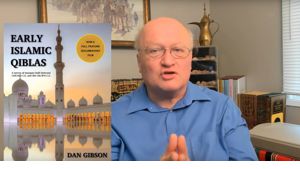
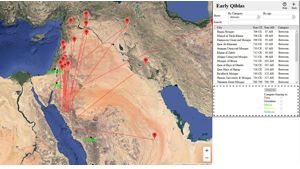
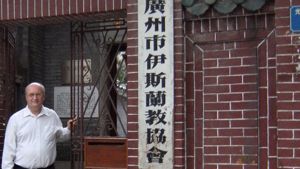
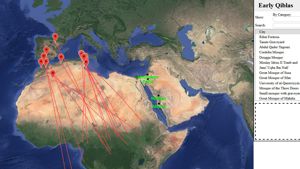
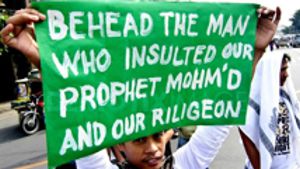
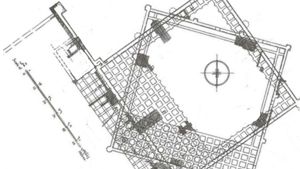
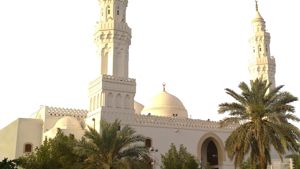
Page Discussion
Membership is required to comment. Membership is free of charge and available to everyone over the age of 16. Just click SignUp, or make a comment below. You will need a user name and a password. The system will automatically send a code to your email address. It should arrive in a few minutes. Enter the code, and you are finished.
Members who post adverts or use inappropriate language or make disrespectful comments will have their membership removed and be barred from the site. By becoming a member you agree to our Terms of Use and our Privacy, Cookies & Ad Policies. Remember that we will never, under any circumstances, sell or give your email address or private information to anyone unless required by law. Please keep your comments on topic. Thanks!